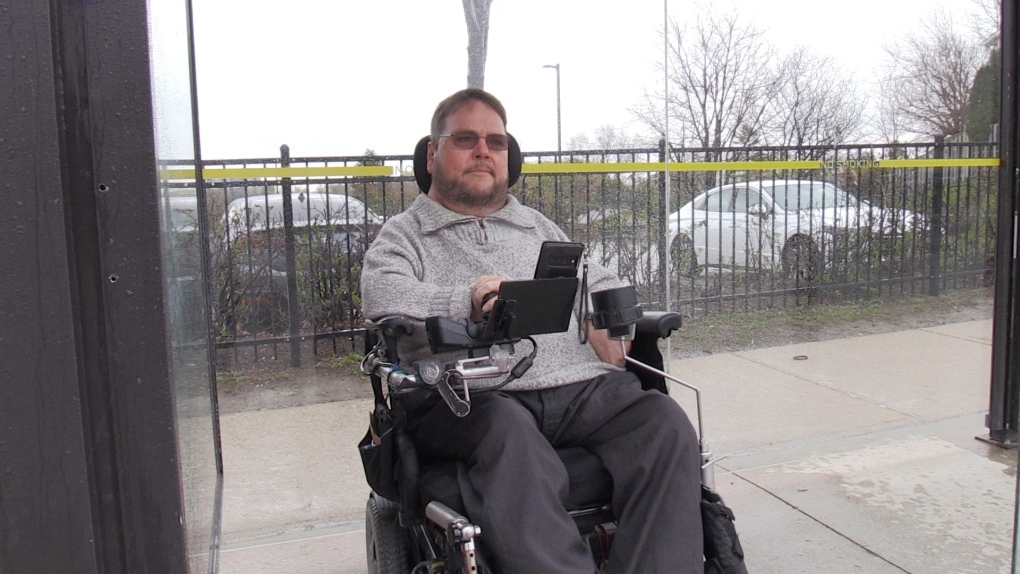GRT bus strike leaves commuters with mobility issues with few options
Grand River Transit (GRT) bus service came to a screeching halt Monday as drivers walked off the job.
Bus operators and other transit workers, represented by Unifor Local 4304, rejected a temporary agreement with the Region of Waterloo late Sunday, holding out for better wages and scheduling provisions.
The strike has left many riders scrambling, but the impact is being felt particularly acutely by those with mobility issues. Many are now stuck, with almost no options to get around.
“People are really concerned because they’ve got doctors appointments to go to. They need groceries and other supplies,” said Edward Faruzel, executive director of KW AccessAbility
Faruzel says there are less than 10 accessible cabs in the region, and many don’t want to pay for a taxi for a quick trip.
“Transportation should be an essential service. That would really solve the issue right there because it does effect the most vulnerable people,” Faruzel said.
 Edward Faruzel, KW AccessAbility Executive Director, at a bus stop on May 1, 2023. (Colton Wiens/CTV Kitchener)
Edward Faruzel, KW AccessAbility Executive Director, at a bus stop on May 1, 2023. (Colton Wiens/CTV Kitchener)
“If you know somebody that has a disability, maybe check in with them because they might need some help, and they might not want to ask.”
STUDENT UNIONS SAY IMPACT WILL BE 'TREMENDOUS' IF STRIKE CONTINUES
Meanwhile, post-secondary students are not in class this week, but student unions are trying to get the message out in case the strike continues, posting on social media and emailing next semester’s students about the possibility.
“We’ve put in place more positions and people who are able to respond and able to offer these solutions to students to be able to help them,” said Rory Norris, president of the Waterloo Undergraduate Student Association
The association says almost 23,000 University of Waterloo students used GRT services last semester.
 Picketers with Unifor Local 4304 outside the GRT Operations Centre on May 1, 2023. (CTV Kitchener)
Picketers with Unifor Local 4304 outside the GRT Operations Centre on May 1, 2023. (CTV Kitchener)
Conestoga College’s students group says about 57 per cent of students in the Region of Waterloo use transit services – and they’re hoping the strike ends soon.
“The impact on our students will be tremendous. Summer is starting. A lot of them have jobs that they’re going to work to try to pay their own bills. Some of them are taking summer classes in hopes of graduating earlier. So this strike really does affect them,” said Nelson Chukwama, president of Conestoga Students Inc.
ION train service is running as it is maintained and operated by a separate company. But riders can only get so far. The train covers a thin portion of the core, while bus routes stretch all over the region.
“It’s tough, we’re basically back in lockdown again. People rely on transportation to go anywhere and do anything,” Faruzel said.
CTVNews.ca Top Stories

Canadian team told Trump's tariffs unavoidable right now, but solutions on the table in surprise Mar-a-Lago meeting
During a surprise dinner at Mar-a-Lago, representatives of the federal government were told U.S. tariffs from the incoming Donald Trump administration cannot be avoided in the immediate term, two government sources tell CTV News.
Toronto man accused of posing as surgeon, performing cosmetic procedures on several women
A 29-year-old Toronto man has been charged after allegedly posing as a surgeon and providing cosmetic procedures on several women.
Saskatoon priest accused of sexual assault says he meant to encourage young girl with hug and kiss
A Saskatoon priest accused of sexual assault says he meant to encourage and reassure a young girl when he hugged and kissed during his testimony at Saskatoon Provincial Court Friday.
Bob Bryar, drummer for rock band My Chemical Romance, dead at 44
Bob Bryar, former drummer for the band My Chemical Romance, has died. He was reportedly 44.
Trump threatens 100% tariff on the BRIC bloc of nations if they act to undermine U.S. dollar
U.S. president-elect Donald Trump on Saturday threatened 100 per cent tariffs against a bloc of nine nations if they act to undermine the U.S. dollar.
W5 Investigates 'I never took part in beheadings': Canadian ISIS sniper has warning about future of terror group
An admitted Canadian ISIS sniper held in one of northeast Syria’s highest-security prisons has issued a stark warning about the potential resurgence of the terror group.
'Disappointing': Toronto speed camera cut down less than 24 hours after being reinstalled
A Toronto speed camera notorious for issuing tens of thousands of tickets to drivers has been cut down again less than 24 hours after it was reinstalled.
Bruce the tiny Vancouver parrot lands internet fame with abstract art
Mononymous painter Bruce has carved a lucrative niche on social media with his abstract artworks, crafted entirely from the colourful juices of fruits.
Poilievre suggests Trudeau is too weak to engage with Trump, Ford won't go there
While federal Conservative Leader Pierre Poilievre has taken aim at Prime Minister Justin Trudeau this week, calling him too 'weak' to engage with U.S. president-elect Donald Trump, Ontario Premier Doug Ford declined to echo the characterization in an exclusive Canadian broadcast interview set to air this Sunday on CTV's Question Period.































